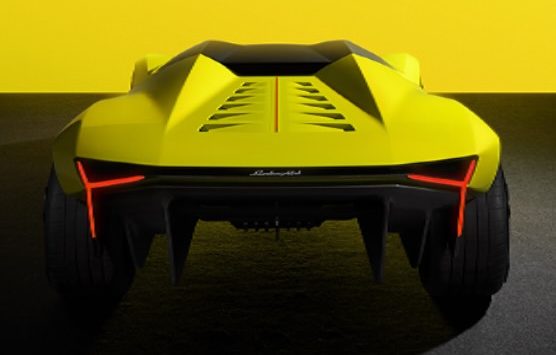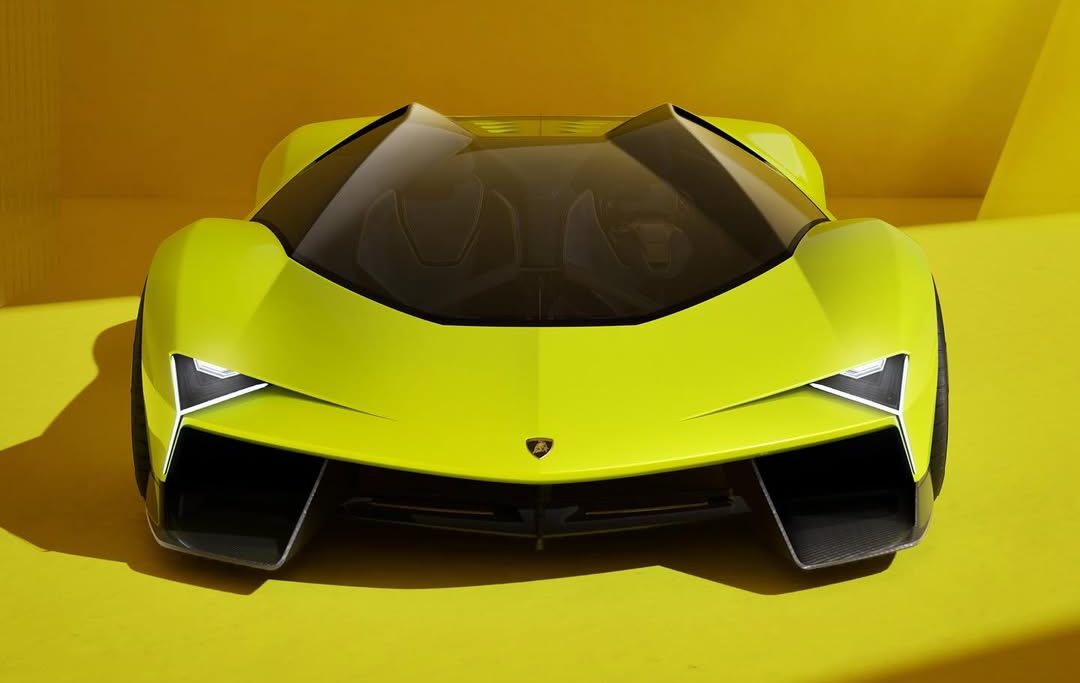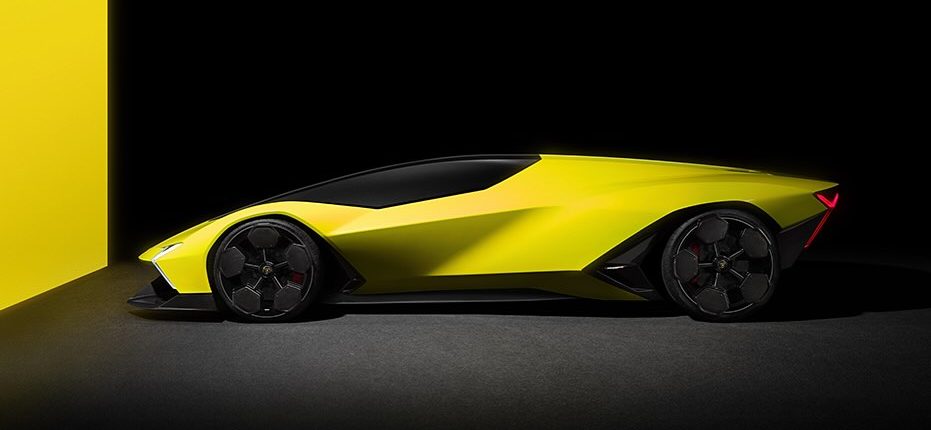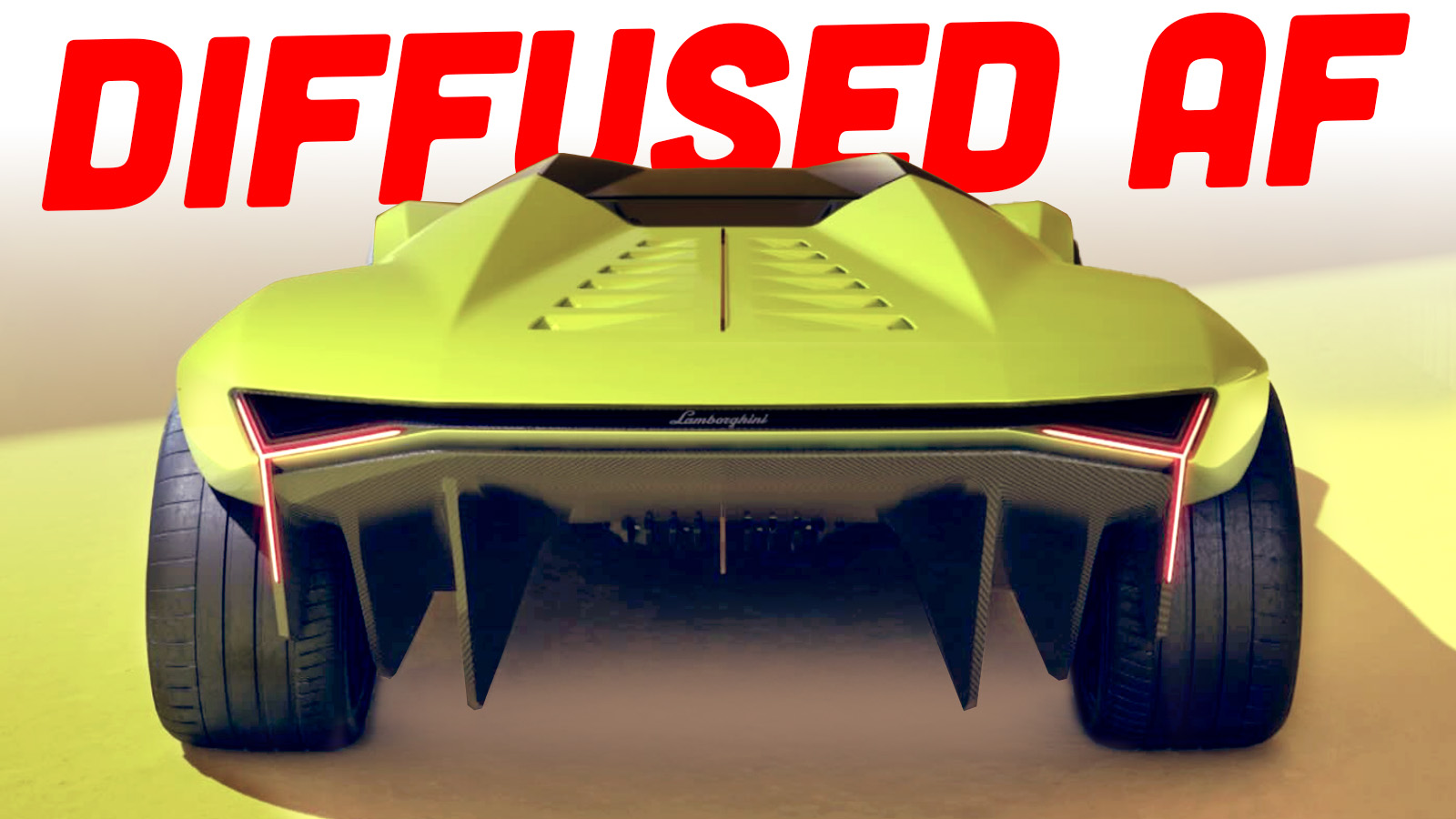Lamborghini’s in-house design studio, Centro Stile, has been around for 20 years. In those two decades, it’s come up with some of the most striking, memorable supercars the world has ever seen. The studio is responsible for cars like the Sesto Elemento, the Huracán, the Reventon, the Veneno, and the Murcielago. It’s also penned concepts like the Asterion, the Estoque, and the all-electric Terzo Mellennio, just to name a few.
To celebrate the 20 years, Lamborghini’s head designer, Mitja Borkert, has published photos of a new concept from the brand. It’s called the Manifesto, and according to him, it’s meant to showcase “the potential future of our unique Design DNA.”
There aren’t any mechanical details available, though the 12 louvers on the rear decklid suggest a 12-cylinder engine hiding somewhere in the body. Where exactly, I’m not sure — the area where you’d expect an engine and transaxle to be is negative space, taken up by one of the biggest diffuser systems I’ve ever seen. For those unfamiliar, a diffuser is a piece of bodywork mounted underneath a car designed to accelerate the air traveling beneath the body. This creates a low-pressure zone, essentially “sucking” the car into the pavement, increasing downforce, according to Racecar-Engineering.com.

The rest of the car is very Lamborghini, with a cab-forward interior and an ultra-pointy nose. There’s Y-shaped lighting front and rear, staying in line with the company’s corporate design ethos that has blessed nearly all of its concepts since 2017, when the Terzo Melennio debuted. The sharp edges that start at the headlights trail all the way through the windshield, making for a dramatic front-on view—it almost looks like the car has horns.

From the side, the Manifesto could almost be confused for one (or several) of Chevy’s Corvette concepts released this year. The Lamborghini is differentiated by its angular rear fender, a design cue that dates all the way back to the original Countach. There are no visible doors or body lines—perhaps getting inside requires the entire body to be lifted off the chassis, top-fuel dragster style. The glass canopy could also lift up, fighter jet-style. That would be more in line with Lamborghini’s typical design inspirations.

The Manifesto’s long tail features no wing whatsoever. It’s perfectly smooth and flat, and reminds me of something like a McLaren Speedtail, except without the flexible body parts. The rear end also leaves the rear-facing parts of the back tires fully exposed—another signature Lamborghini design element that’s present on its two production sports cars. Except here, it’s far more pronounced.
Like most of Lamborghini’s concepts, there’s no sign the Manifesto is destined for any sort of production run. As Borkert said, it’s simply a display piece to show off what’s to come from the brand, rather than a preview for a road-going model. In the future, we may see elements from the Manifesto appear on production vehicles, but don’t expect to see one at your Local Cars & Coffee event.









I like the exposed rear tires and winglessness, but if/when something like this eventually hits the streets of LA, they’re just going to be driven at unsafe, anti-social speeds by ‘influencers’ and the teenage children of rich a$$holes, who are themselves, of course, a$$holes.
The Lambo Urus is giving the MB G-Wagen a run for its money as the official chariot of douchbags everywhere. A gross generalization maybe, but you can only ignore anecdotal evidence for so long…
That is the butt of an anorexic.
Too much thigh gap.
Do not like.
Looks like a women’s electric shaver.
Looks like some sort of dune buggy from the rear.
“ the area where you’d expect an engine and transaxle to be is negative space, “
So if a space is a space, and a negative space is also a space, then do both maths and words fail to mean anything at all anymore?
So I haven’t been a fan of Lamborghini’s designs for a long time but this looks pretty sharp.
So memorable that this (former) Lamborghini fan forgot half of those models and can’t picture them, but I’m still sure I could draw them with fair accuracy.
It doesn’t need doors. It’s self driving. In fact, you can’t even drive it at all. You can’t even sit in it. You don’t understand because you can’t afford it. OK, peasant, you’ve looked at it long enough, get back to work.
Car makers are already wasting time and effort engineering incredible hypercars which are then bought by rich people an kept in air-conditioned garages an never driven. Why not just acknowledge that and completely remove the passenger compartment?
As long as you sell it to someone who will park it in a hermetically sealed garage and never drive it who cares how much of a POS it is?
Well I guess this is a story on hot wheels cars because it isn’t providing real car information.
I see that photos have been published in Instagram. I see that the author of this article has stated that is just speculation as to the engine. Looking around a bit, I see that a competitor site has no information on the concept.
So, is it your position that no car concept should be reported on unless the mechanicals are detailed? So many concept cars are either styling mockups rolling around on a steel frame with a slow-limp electric motor (if any at all), or nowadays are just digital renderings. Should these be ignored, and unreported upon?
How derivative
nope.
I’m not sold on the front or back but I’m digging that profile.
On one hand, I understand this is a styling concept and not intended to be a practical or even working car. On the other, I’ve seen Hot Wheels original designs that have more mechanical feasibility than whatever they did here. How do the rear wheels get torque? Hub motors? Chains running down swingarms?
Front-wheel drive, obviously!
See, but the shape suggests mid-engine, and the only thing that comes to mind like that is a forrrrrr…
…wait, Lamborghini makes tractors, (sort of,) could this be a drivetrain development mule for a Forklift?!
Portal axles.
Friction drive from little rubber wheels that press on top of the tires!
Bluetooth.
Torque by Bluetooth is the holy grail of vehicle packaging.
Rumors are Apple has already figured out torque by Bluetooth (BlueTorque™). The main problem, other than battery drain, is that the next generation of AirPods delivered undesirable Newton-meters of torque steer to the wearers’ spinal columns.
Can this be applied remotely by another user?
My brain telegraphed Lancia Stratos when I look at the back. I don’t know why.
I was getting major Stratos vibes as well. If the lack of door lines is to be real (not just due to omission for the sake of keeping the illustration focused on form), and it uses a lift-up canopy then it’s even more Stratos-like.
Big yawn. Looks like a modern Lamborghini. Also, I can’t really recall any of the “iconic” cars mentioned in the article. They all looked pretty much alike, from what I dimly recall. Low, wide, pointy face, lots of angry vents and scoops. Meh. Same same, only different.
Also also, not exactly something anyone will ever see driving around. Like every other modern supercar, they are bought and put into a climate controlled garage to stagnate. People who would drive them can’t afford them, and the people who can afford them are probably too old to do the contortions necessary to get into them, or are a professional athlete.
I appreciate you providing a banana for scale, but where’s the car?
This is 1000× times better looking than anything Pininfarina-less Ferrari has designed in the last 10 years or so.
Headroom is great – If you are from France.
I suspect a certain Mr Beldar and Mrs Prymaat would suggest the headroom is insufficient.
Needs chrome reclining lady figures on a gigantic mudflap, like a pervs semi truck. Might actually work for the intended demographic of this car
Would Yosemite Sam work? That way I can park it at work without a phone call from HR.
Something about it reminds me of supercars from the ’70s. Specifically the Pantera. The tires are so exposed from the rear end.
I like it well enough. I do wish Lamborghini would make an effort to recreate the progressive nature of the original Countach rather than lazily restyle it over and over and over. That is the issue with a brand that found success based on a single design. The chances of capturing lightning in a bottle twice are low, and there is money to be made selling a design that has a very specific meaning within a culture.
This is a restyled Countach?
Basically. But every one of their sports cars has been just that since the Countach was released.
A very accurate statement.
It’s more of an updated Countach. Do an image search on 1974 Countach Yellow. That is what this car would look like when made to a production spec.
Now that’s not to say it’s a bad thing. That 74 Countach was amazing.
This looks as much like the original Countach as it does an AMX/3 or Pantera…
Or any other modern sports car from the early 70s.
’68 Alfa Romeo Carabo, ’70 Ferrari Modulo, ’70 Vauxhall SRV, ’74 Lamborghini Bravo, ’78 DomeZero, ’71 Maserati Boomerang, ’70 Lancia Stratos HF Zero, ’68 Bizzarrini Manta, Isdera Imperator 108i, Vector W2 and W8, Lotus Esprit,
Oh yeah, the original Pantera. Such another clean design
Not even close. The Countach and most Lamborghinis since have been wedge-shaped designs, which the AMX/3 and Pantera were most definitely not. Lamborghini had the short hood, which basically matches the angle of the windshield, then peaks near the top of the windshield and very slowly drops over a long roof and rear engine cover to the back end, with no stylized fender bulges above the wheels.
This concept car follows every meaningful feature of the original Countach. It is basically the same creative brief executed in different decades.
You keep referencing a windshield angle, and yet the side profile view shows a fighter jet canopy.
Come on man, this could hearken back to anything, and calling it a Countach re-hash is just silly.
A modern day 911 shares way more similarities with those of yesteryear than this thing does with a Countach. If this was meant to be a continuation of Countach design, why wouldn’t they say so? And heck, they’ve even showed us what a modern Countach inspired design is, with the Countach LPI 800-4.
This and a new 911 are good comps. They both use the exact same key design characteristics of the originals.
It is truly hard to imagine this in any context outside of it being a Countach modernization. As I said, since the Countach, all the super/hypercar Lamborghinis have been. The Diablo, Murciélago, Gallardo, Huracán, etc, have all used the exact same recipe recooked in a modern context. Just like the 911.
It is the signature Lamborghini look from which they never deviate. Just like Porsche and the 911. Which, for me, is disappointing since prior to the Countach Lamborghini would actually create different, interesting designs from model to model.
So like 7 models, but even then most clearly have a series of restyling of many others? The Islero is clearly a restyle of a 400GT which is almost a one-for-one dupe of the 350GT. The Urraco is just like a low-spec Espada but with pointy front clip. The Espada is also the basis of the Jarma, but they just shortened it and slightly squared it up. Not exactly the most interesting and varying designs from model to model here. Honestly, across the 7 models made prior to the Countach, it’s only like 3 distinct designs: GT, Miura, & Espada-derivatives.
Even if you just count the 350/400 GT, Islero and Jarama as basically the same core design, there were the Miura, Espada, and Urraco as meaningfully unique designs. Four interesting and unique designs over 9 years, which is about one every two years.
The derivatives of the single Countach design have lasted 50 years.
My point stands.
I think we are arguing the same thing here. Those 9 years also included more models and market segments than I think any other 9 year window since, yet they still had very minimal design variations. With the exception of the 350GT/400GT/Islero dramatic change to the Espada, the only other time Lamborghini has really changed the design languages for a car in the same segment has been the Miura to Countach and the Jalpa to Gallardo which picked up the same Countach shape as the Murci/Diablo/Countach. Everything else has pretty much been a restyling of the previous gen.
Gotcha! Agreed.
The original car featured with Jerry Seinfeld and Jim Carrey was my first exposure to the original design. It was amazing on how clean it is
Miura?
The Miura had a very different look. As did the Espada. Much more pronounced hoods and/or pronounced bulging fenders above the wheels.
The Countach manifested the true wedge design and ushered that style into mainstream consciousness. The short hood, which basically matches the angle of the windshield, then peaks near the top of the windshield and very slowly drops over a long roof and rear engine cover to the back end as well as no fender bulges above the wheels. The smaller signature elements like the three-angle leading edge of the windshield, the Venturi-shaped side vent, and the angular rear wheel cutout are a part of it as well. All of that was codified with the Countach and hasn’t been messed with since.
None of the other supercars of the era was really a wedge design. Not anything from Maserati, Ferrari, or DeTomaso. They all had pointy fronts but windshields which were clearly at a much different angle, along with a more pronounced hood.